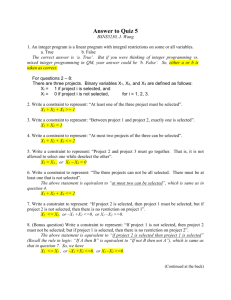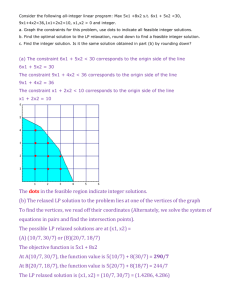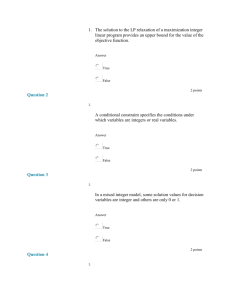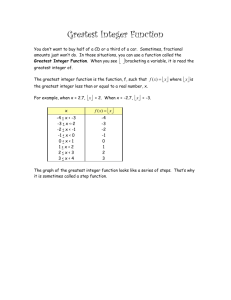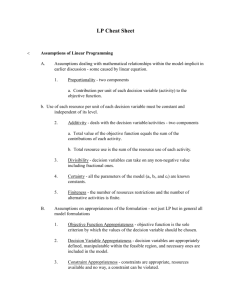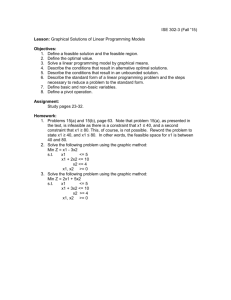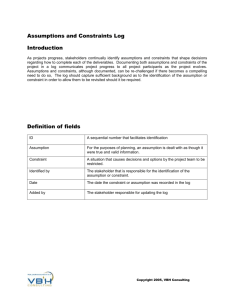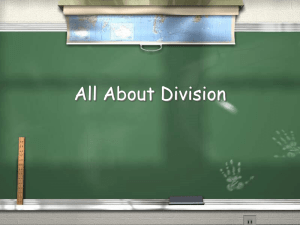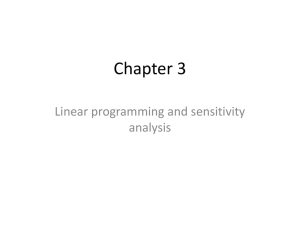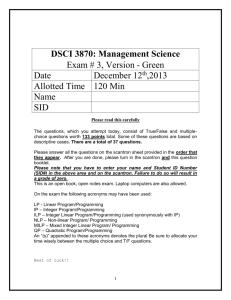Question 1 If we are solving a 0-1 integer programming problem with
advertisement
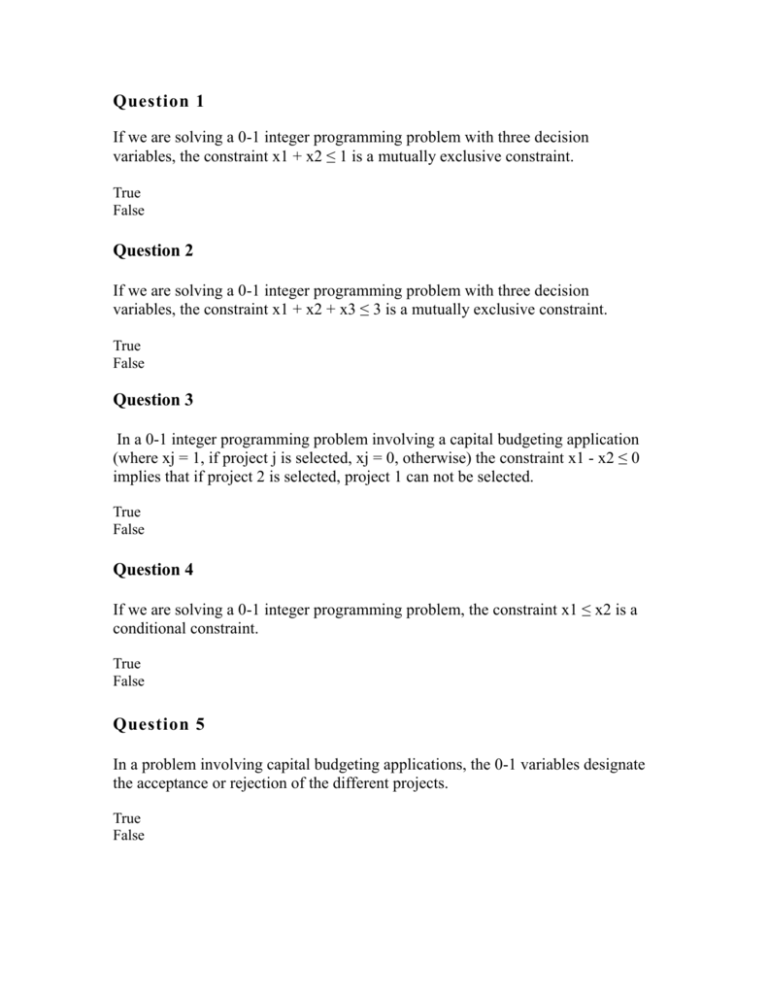
Question 1 If we are solving a 0-1 integer programming problem with three decision variables, the constraint x1 + x2 ≤ 1 is a mutually exclusive constraint. True False Question 2 If we are solving a 0-1 integer programming problem with three decision variables, the constraint x1 + x2 + x3 ≤ 3 is a mutually exclusive constraint. True False Question 3 In a 0-1 integer programming problem involving a capital budgeting application (where xj = 1, if project j is selected, xj = 0, otherwise) the constraint x1 - x2 ≤ 0 implies that if project 2 is selected, project 1 can not be selected. True False Question 4 If we are solving a 0-1 integer programming problem, the constraint x1 ≤ x2 is a conditional constraint. True False Question 5 In a problem involving capital budgeting applications, the 0-1 variables designate the acceptance or rejection of the different projects. True False Question 6 A conditional constraint specifies the conditions under which variables are integers or real variables. True False Question 7 If we are solving a 0-1 integer programming problem, the constraint x1 + x2 = 1 is a __________ constraint. *multiple choice *mutually exclusive *conditional *corequisite Question 8 Binary variables are: . 0 or 1 only . any integer value . any continuous value . any negative integer value 2 points Question 9 In a 0-1 integer programming model, if the constraint x1-x2 = 0, it means when project 1 is selected, project 2 __________ be selected. . . . . can also can sometimes can never must also Question 10 In a __________ integer model, some solution values for decision variables are integers and others can be non-integer. . total . 0-1 . mixed . all of the above Question 11 If we are solving a 0-1 integer programming problem, the constraint x1 ≤ x2 is a __________ constraint. . multiple choice . mutually exclusive . conditional . corequisite Question 12 If the solution values of a linear program are rounded in order to obtain an integer solution, the solution is : . always optimal and feasible . sometimes optimal and feasible . always optimal but not necessarily feasible . never optimal and feasible Question 13 Assume that we are using 0-1 integer programming model to solve a capital budgeting problem and xj = 1 if project j is selected and xj = 0, otherwise. The constraint (x1 + x2 + x3 + x4 ≤ 2) means that __________ out of the 4 projects must be selected. . . . . exactly 2 at least 2 at most 2 none of the above Question 14 The Wiethoff Company has a contract to produce 10000 garden hoses for a customer. Wiethoff has 4 different machines that can produce this kind of hose. Because these machines are from different manufacturers and use differing technologies, their specifications are not the same. Write a constraint to ensure that if machine 4 is used, machine 1 will not be used. . . . . Y1 + Y4 ≤ 0 Y1 + Y4 = 0 Y1 + Y4 ≤ 1 Y1 + Y4 ≥ 0 Question 15 The Wiethoff Company has a contract to produce 10000 garden hoses for a customer. Wiethoff has 4 different machines that can produce this kind of hose. Because these machines are from different manufacturers and use differing technologies, their specifications are not the same. Write the constraint that indicates they can purchase no more than 3 machines. . Y1 + Y2 + Y3+ Y4 ≤ 3 . Y1 + Y2 + Y3+ Y4 = 3 . Y1 + Y2 + Y3+ Y4 ≥3 . none of the above Question 16 Max Z = 5x1 + 6x2 Subject to: 17x1 + 8x2 ≤ 136 3x1 + 4x2 ≤ 36 x1, x2 ≥ 0 and integer What is the optimal solution? . . . . x1 = 6, x2 = 4, Z = 54 x1 = 3, x2 = 6, Z = 51 x1 = 2, x2 = 6, Z = 46 x1 = 4, x2 = 6, Z = 56 Question 17 You have been asked to select at least 3 out of 7 possible sites for oil exploration. Designate each site as S1, S2, S3, S4, S5, S6, and S7. The restrictions are: Restriction 1. Evaluating sites S1 and S3 will prevent you from exploring site S7. Restriction 2. Evaluating sites S2 or S4 will prevent you from assessing site S5. Restriction 3. Of all the sites, at least 3 should be assessed. Assuming that Si is a binary variable, the constraint for the first restriction is . . . . S1 + S3 + S7 ≥ 1 S1 + S3 + S7 ≤1 S1 + S3 + S7 = 2 S1 + S3 + S7 ≤ 2 Question 18 In a 0-1 integer programming model, if the constraint x1-x2 ≤ 0, it means when project 2 is selected, project 1 __________ be selected. . must always . can sometimes . can never . A and B Question 19 Consider the following integer linear programming problem: Max Z = 3x1 + 2x2 Subject to: 3x1 + 5x2 ≤ 30 5x1 + 2x2 ≤ 28 x1 ≤ 8 x1 ,x2 ≥ 0 and integer What is the optimal solution? Write your answer in the form : ( x1, x2, z). (For example, the expression (10, 20, 50) means that x1 = 10, x2 = 20, and z = 50). Answer: _______________ Question 20 Max Z = 3x1 + 5x2 Subject to: 7x1 + 12x2 ≤ 136 3x1 + 5x2 ≤ 36 x1, x2 ≥ 0 and integer Find the optimal solution. Write your answer in the form : ( x1, x2, z). (For example, the expression (10, 20, 50) means that x1 = 10, x2 = 20, and z = 50). Answer: _________________
